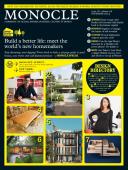
Issue 78
Build a better life: meet the world’s new homemakers. Stop dreaming, start digging! From brick to bath, a 48-page guide to good houses, cosy rooms and well-planned projects – a Monocle special
In This Issue
Oops! No content was found.
Looks like we no longer have content for the page you're on. Perhaps try a search?
Return Home

